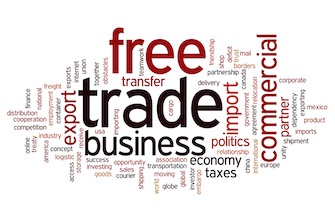 To listen to the critics, one would believe that the Trans-Pacific Partnership (TPP) Trade Agreement marks the end of the world for global health, especially for the poor. (Consider this, this, this, this, and this.) They are, in a word, wrong. Admittedly, the TPP Agreement is extremely contentious. Moreover, the implications for global public health are significant, but for the better – if we do this right.
To listen to the critics, one would believe that the Trans-Pacific Partnership (TPP) Trade Agreement marks the end of the world for global health, especially for the poor. (Consider this, this, this, this, and this.) They are, in a word, wrong. Admittedly, the TPP Agreement is extremely contentious. Moreover, the implications for global public health are significant, but for the better – if we do this right.
The TPP Agreement contains important provisions regarding intellectual property (IP) rights, especially the standards of protection for pharmaceuticals. Given that the TPP negotiations include a dozen nations[1] and these nations represents close to 40 percent of global GDP, the agreement presents a tremendous opportunity to improve global health. Moreover, through the TPP, the United States has a chance to both encourage trade, stimulate economic growth, and foster greater innovation. Medical progress is rooted in innovation, especially advances in pharmaceutical therapies and cures. History has taught us what works, and the TPP provisions will ensure that the standards that encourage innovation are protected.
Critics of the TPP Agreement claim that its IP standards will result in higher drug prices and create barriers to access for the world’s most vulnerable populations. The amfAR website claims that the TPP “threatens the future availability of affordable generic medicines and could undermine the global HIV response in developing countries”, while Doctors without Borders writes “the TPP agreement is on track to become the most harmful trade pact ever for access to medicines in developing countries”. IP Detractors are conflating two issues: intellectual property protection for pharmaceutical innovation and drug prices. They are separable. Moreover, if the global community is to truly benefit from the promise of medical progress, we must stop the attack on the IP protections that incentivize innovation and turn our attention to the issues that genuinely inhibit access to medicines.
[Kristina]
For the most vulnerable among us, better health is inextricably linked to two things: poverty and incentivizing the development of treatments for diseases of the poor. Again, these issues are separable and must be addressed independently. Intellectual property protection addresses the second, and has done so to great success. Moreover, creative applications of IP rights have resulted in the development of medicines for previously-ignored conditions. As reported by the New England Journal of Medicine, “In 2013, the Food and Drug Administration (FDA) approved 27 new drugs for marketing. Eight of these drugs are for orphan diseases, including six rare cancers. In fact, more than half of the 139 drugs approved by the FDA since 2009 are for orphan diseases and cancers.”[2]
Consider too the FDA’s Priority Review Voucher (PRV), which became law in 2007. In this case, upon the development of a treatment for a neglected or rare pediatric disease (one of 16 specified conditions), the innovator receives a voucher for priority review from the FDA to be used with a product of its choice, sold or transferred. The priority review reduces the amount of time needed to receive an FDA review decision, allowing blockbuster drugs to reach the market more quickly.[3] As a result, innovation is rewarded and neglected diseases receive research attention. To date, six vouchers have been awarded. (Details are available here.)
Pharmaceutical innovation and intellectual property rights are even more important as we consider the growing burden of non-communicable diseases (NCD’s), the most prominent drivers of healthcare costs. The costs in terms of both human health and economic prosperity are significant and Asia will be the hardest hit. A recent World Economic Forum report on NCDs reports the following:
Claiming 63% of all deaths, these diseases are currently the world’s main killer. Eighty percent of these deaths now occur in low- and middle-income countries. Half of those who die of chronic non-communicable diseases are in the prime of their productive years, and thus, the disability imposed and the lives lost are also endangering industry competitiveness across borders. . . Over the next 20 years, NCDs will cost more than US$ 30 trillion, representing 48% of global GDP in 2010, and pushing millions of people below the poverty line.[4]
To truly address global health issues and the future threats to our wellbeing, we should incentivize more – not less – pharmaceutical research and development. The IP standards contained within the TPP Agreement are a step in the right direction and should be embraced. Specifically, according to the Office of the U.S. Trade Representative, the TPP Agreement seeks “pharmaceutical IP provisions that promote innovation and the development of new, lifesaving medicines, create opportunities for robust generic drug competition, and ensure affordable access to medicines, taking into account levels of development among the TPP countries and their existing laws and international commitments”.[5]
Recalling Churchill’s famous words, “Democracy is the worst form of government, except for all those other forms that have been tried from time to time”.[6] Intellectual property rights may be the worst form of incentivizing innovation, except for all those other forms that have been tried. Until a better system is devised, we should be extremely wary of those who suggest we abandon what works.
__________
[1] The United States and eleven other nations (Australia, Brunei Darussalam, Canada, Chile, Japan, Malaysia, Mexico, New Zealand, Peru, Singapore, and Vietnam) are involved in the TPP negotiations.
[2] Kocher, Robert, and Bryan Roberts. “The Calculus of Cures,” The New England Journal of Medicine, online edition, 26 February 2014.
[3] Under a priority review, the FDA attempts to render a decision in 6 months. In contrast, a standard review is completed in about 10 month, and sometimes takes much longer. The median difference is approximately 7 months (Grabowski, Henry G., David B. Ridley, and Jeff Moe, “Priority Review Vouchers to Encourage Innovation for Neglected Diseases,” Prescribing Cultures and Pharmaceutical Policy in the Asia-Pacific, K. Eggleston Brookings Institution Press, 2009.)
[4] Bloom, D.E., Cafiero, E.T., Jané-Llopis, E., Abrahams-Gessel, S., Bloom, L.R., Fathima, S., Feigl, A.B., Gaziano, T., Mowafi, M., Pandya, A., Prettner, K., Rosenberg, L., Seligman, B., Stein, A.Z., & Weinstein, C. The Global Economic Burden of Noncommunicable Diseases. Geneva: World Economic Forum, 2011.
[5] United States Trade Representative. “Trans-Pacific Partnership: Summary of U.S. Objectives,” web posting.
[6] From a House of Commons speech on Nov. 11, 1947.

![[IPWatchdog Logo]](https://ipwatchdog.com/wp-content/themes/IPWatchdog%20-%202023/assets/images/temp/logo-small@2x.png)

![[Advertisement]](https://ipwatchdog.com/wp-content/uploads/2024/04/Artificial-Intelligence-2024-REPLAY-sidebar-700x500-corrected.jpg)
![[Advertisement]](https://ipwatchdog.com/wp-content/uploads/2024/04/Patent-Litigation-Masters-2024-sidebar-700x500-1.jpg)

![[Advertisement]](https://ipwatchdog.com/wp-content/uploads/2021/12/WEBINAR-336-x-280-px.png)
![[Advertisement]](https://ipwatchdog.com/wp-content/uploads/2021/12/2021-Patent-Practice-on-Demand-recorded-Feb-2021-336-x-280.jpg)
![[Advertisement]](https://ipwatchdog.com/wp-content/uploads/2021/12/Ad-4-The-Invent-Patent-System™.png)






Join the Discussion
6 comments so far.
Clement Cherlin
August 17, 2015 04:01 pmGene Quinn-
How do you know that it is possible to write code without infringing someone’s software patent(s) when it’s literally impossible to determine whether or not a given program infringes one or more patents?
Because willful infringement incurs treble damages, and patents are so poorly written that nobody can tell what will or will not infringe them, the standard advice now is to not perform a patent search. It can only cause you more harm than good.
Software programmers don’t need special rules. We need the rules that exist, which say that you cannot patent laws of nature, abstract ideas and mathematical formulas, enforced. That would render all pure software patents invalid, and satisfactorily resolve the problem.
“ignorant”, “skills are lacking”, “cry me a river”: Namecalling and schoolyard insults are inappropriate and counterproductive. Knock them off.
Gene Quinn
August 16, 2015 10:06 amJoe-
It seems that you have never written any code, and/or you have no knowledge of patents. I have written code and it is easily possible to write 50 lines of code without infringing someone’s software patent. Only someone completely unfamiliar with patent law would ever say such an ignorant thing.
As far as needing to search patents… you don’t have to do that if you don’t want. Of course, if you get sued and lose because you infringe that is your problem.
I love how ignorant people like you think that software programmers should have special rules and not need to engage in business in appropriate, legal ways. You may think you are different than other businesses, but the truth is the only difference is you and so many others who complain about software patents are commenting on a topic you know nothing about and expecting sympathy because your business skills are lacking. Cry me a river.
-Gene
Joe
August 15, 2015 01:23 amI am guessing you have never written any code. If so you would know you couldn’t write 50 lines without infringing someone’s software patent. How does it help innovation if you naturally come up with obvious ideas every few minutes, but need to search 100,000s of patents all the time?
Clement Cherlin
June 9, 2015 04:02 pmDear Dr. Kristina Lybecker: Your argument is, in a word, invalid. You write, “IP Detractors are conflating two issues: intellectual property protection for pharmaceutical innovation and drug prices. They are separable.”
That is a contentious assertion that requires substantial justification, which you do not provide. You instead assume, without evidence, and contrary to basic economics, that it is true.
You cannot separate pricing from supply and demand. It is the central purpose of monopoly protections on pharmaceuticals to eliminate market competition in certain goods for limited periods of time. It is the central purpose of eliminating market competition to permit monopoly holders to make more money than they otherwise would in a competitive market. They may set prices without concern for being undercut. They are guaranteed a 100% share of the market in their monopolized good.
Monopoly holders have enormous price leverage. That directly affects the price of monopolized goods. It has to. The only way it can fail to is if governments limit prices for monopolized goods. And guess what the TPP does? It restricts the ability of governments to do that. So, you’re wrong.
Remember that multinational corporations will say whatever they think will advance their financial interests, regardless of the truth. We should maintain a healthy skepticism towards any argument they advance for giving them more power over our economy, our governments, our very lives. They are not charities, and they have few or no moral scruples.
Kate
June 2, 2015 08:59 amIt is so important that the purpose/impact of IP protection is not conflated with other issues as you describe here. I hope that the anti-IP/anti-innovation agenda can be stemmed before we start to see major negative impacts. To do so we need to understand better what misrepresentations/misunderstandings make this position persuasive to so many, as you have done here.
Christopher Haggarty-Weir
June 1, 2015 01:39 pmIt’s nice to read an intelligently written article on the TPP for once. I am not saying I am for it or against it; I really don’t know. But I do get sick of constant appeals to emotion with no actual evidence of claims.